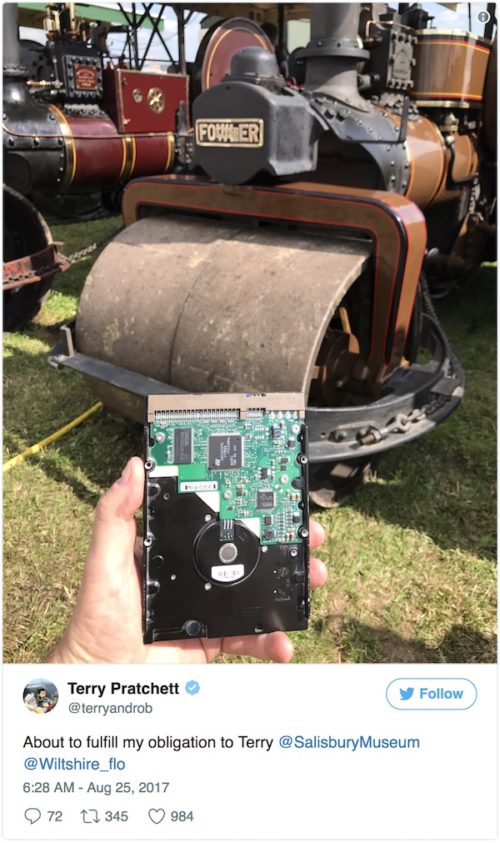Sorry fans, no “Unfinished Tales” for Sir Terry Pratchett. Per his personal request, all of the projects he was working on up to his death have been crushed by a steamroller.
Don’t worry, your screen is not smudged. You did just read “steamroller.”
Rob Wilkins, who manages the Pratchett estate, recently brought the hard drive in question to the Great Dorset Steam Fair. There, it was crushed by a vintage steamroller named Lord Jericho.

After Tweeting a picture of the crushed remains, Wilkins announced that what’s left of the hard drive will be put on display at the Salisbury Museum’s upcoming exhibition, Terry Pratchett: HisWorld, starting on September 16th. So you can see the last stories Terry Pratchett ever worked on! You know, on this… scrapped circuit board.
Following Pratchett’s death in 2015, Neil Gaiman informed The Times that having his work destroyed in such a way was among the author’s last requests. It took a couple of years, but the deed has finally been done. No bits of story to be trotted out and expanded upon by another author. No half-finished manuscripts to speculate on. No unedited paragraphs to poke at for typos.
As it becomes easier and easier for us to leave work and sundry behind thanks to the seemingly endless space available on computers and clouds and social media, it’s important to decide where it all ends up. Good on Sir Terry for having such precise plans regarding the last of his work. Vintage steamroller is one classy form of destruction.











Barely looks like it cracked the casing. Circuit board may be dead but unless they take a magnet to it, the data on the platters is still recoverable.
That’s a “before” picture. The tweet says “about to fulfill” not “have fulfilled.” The remains after this would look much differently.
It still hurts that there will be no further stories by him, but I’m really glad that they honoured his last wishes.
Vale Sir Terry
Well, that’s perfectly in keeping with his stated philosophy on managing novel drafts:
While I’m glad he’s not going to have a Tolkienian posthumous literary life, it’s sad he’s also not getting a Kafkaian posthumous literary life.
@1, No magnets necessary. When I was working on plans to deal with disposing of hard drives containing classified data, the technique was simply to open the case and sandblast the media off the disc.
After the steam roller failed to impress, they put it in a crusher. The hard drive is well and truly dead.
Funny to the end. It had to be a vintage steamroller!
As a historian who works with cultural heritage, this saddens me deeply. It is a question of our selfishness versus what future generations can inherit, and really this was a very selfish request on Pratchett’s part. Although not as bad, it feels like Ruskin destroying the pictures of Turner he didn’t think suitable for the artist’s legacy – there not the choice of the artist, but still an issue of controlling legacy. Yet it is also a happening – a performance event similar to many acts of iconoclasm in twentieth and twenty-first-century art, so I am muddled. I love Pratchett’s writing, but this really reminds me of how conflicted I feel about his engagement with his own importance…
@9 – Jarvisimo- I don’t think it was at all selfish of Sir Terry. He was entitled, of course, to dispose of his work as he saw fit. We have 37 of his books, don’t we? Future generations can be satisfied with that legacy :-)
The ending of the disk world
As a historian who works with cultural heritage, you have Pratchett’s published works, and we have a long-standing cultural principle that those works should quickly move out of the private domain, once we’ve satisfied the incentives to publish by granting a (temporary!) copyright.
If you wanted his notes, you’re out of luck; he had a long and loudly-stated preference for denying you that (his words were “get a proper job!”), and he had already destroyed the notes for every published work as soon as the typed manuscript arrived on the publisher’s desk. If you think it’s selfish to withhold private unpublished notes, where do you draw the line? My private diary?
@12 if you were someone important like say a CEO of a company or a president or other figure of historical importance I would suspect he might say you have a duty to later generations to keep them around. Think about all the things we know about George Washington for example because we have his letters that we wouldn’t know otherwise.
I am conflicted.
@9/Jarvisimo – This is his work, it’s up to him what happens to it, surely? You may or may not view it as a loss to the rest of us, but the rest of us has no entitlement whatsoever anything he did not choose to be published.
@13/Zaldar – Again, surely not at the expense of the individual’s expressed wishes?
While his unpublished notes and drafts did have some value to our cultural history, I don’t begrudge Sir Terry his privacy or his control over them. As cultural objects, the published work is vastly more significant since so many more people have read them.
What is of great value is correspondence and writings not related to published works. While they may be even more private, I hope those are preserved so that we may better understand both the life around Sir Terry’s books but also the times in which they were written.
@9 – It doesn’t sit right with me to hear that an author wanting control over their own work is “very selfish.” He gave us thirty-plus novels–wasn’t that enough for you? Sitting in moral condemnation over a man’s dying wish is unbecoming, my dude.